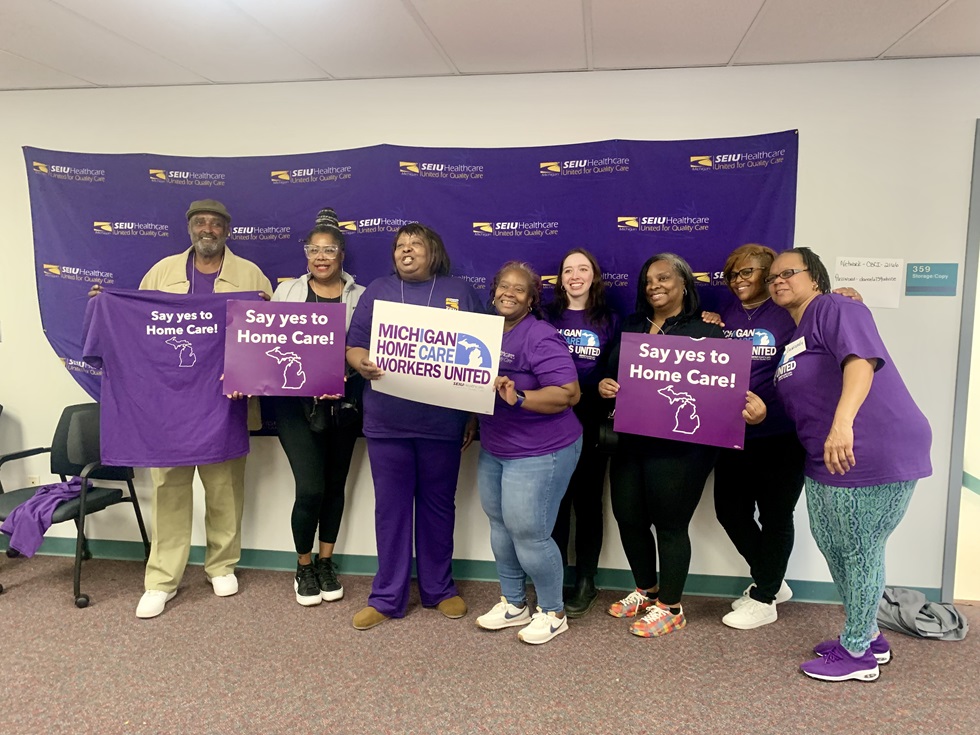
DETROIT—“We’re the backbone of our clients and the union will be our backbone!,” asserted Ravina Turner, a home healthcare worker for 10 years. She and her co-workers are in the midst of an organizing drive with the Service Employees International Union. The campaign, dubbed “Michigan Home Care Workers United” is seeking to organize 35,000 home healthcare workers as part of SEIU’s Healthcare Michigan division.
People’s World was invited to attend the first SEIU Healthcare Michigan organizing committee meeting in Downtown Detroit, just across the street from the sprawling Henry Ford Hospital complex. There were 50 workers present, outfitted in their union’s purple and gold, with a cumulative 577 years of experience working in the field. The campaign was officially launched in Lansing on March 13 and has since taken off, drawing support from the labor movement and the general public alike.
Before former Michigan Republican Governor Rick Snyder rammed through so-called “right to work” legislation in 2012, which eliminated the public employee status of home healthcare workers and thus the right to collectively bargain for better wages, working conditions, and fair contracts; around 50,000 home healthcare workers were represented by a union contract.
Michigan home healthcare workers won their first fight to be considered public employees and be eligible for collective bargaining in 2004. By 2007, the SEIU began representing them, winning wage increases of 55%, a voice in the Home Help Program, access to training, and the first-ever registry to connect workers and clients who need their care. However, since 2012, the conditions these essential workers toil under have not improved. In fact, for a majority of them, working conditions have gone backwards.
“Now 56% of our workforce depend on public assistance just to make ends meet and keep the lights on,” said SEIU Healthcare Michigan Campaign Director Zac Altefogt. “This is more than a union campaign—this is a civil rights campaign! The right wing is trying to crush the power of people of color and women. We’re here to win back our rights!”
In 2023, the state of Michigan finally repealed the deeply hated, anti-worker right-to-work-for less legislation. With a new balance of forces and Democratic majority in the Michigan Congress, the stage is set to renew the struggle for union organizing in the home healthcare and many other professions.

“We need everyone in healthcare to unite with us! From the hospitals to the nursing homes. Every person who cares for someone needs to join us in this fight. Only with a unified voice as working people can we secure a living wage for all,” said Phyllis Pride. She was once a member of AFSCME and has over 20 years of experience under her belt. Now, she is helping lead the struggle to regain, as well as expand, the benefits of union contracts for all home healthcare workers in Michigan.
The Michigan Home Care Workers United campaign is multi-racial, multi-gendered, and multi-generational. The majority of the home healthcare professionals work or reside in Wayne County, which is home to Detroit, a city that is over 78% Black.
Currently, the Service Employees are pushing hard for legislation in the Michigan Senate to re-establish the right to collective bargaining for home care workers, SB 790, as well as ensuring that they can once again be considered employees through the Public Authority, SB 791. The organizing for the union right now includes door-knocking, phone banking, lobbying, and setting up “coffee meetings” with state senators to ensure their voice is heard.
“With better wages and healthcare, we can provide better support to our clients,” Ravina told People’s World. “We need support from the labor movement. Our stories need to be told. This is a high-demand job and the demand is only going to grow.” Workers like Ravina are seeking to organize themselves to fight for higher wages, more hours, transportation reimbursement, respite care, healthcare benefits, and the freedom to join a union without interference.
Isaac Liang, an SEIU organizer involved in the campaign shared with People’s World that, “These essential workers are extremely overlooked. They are practically a driving force in our society and care for our elders, their families, and the disabled.” For this campaign to be successful, he said that “organized labor needs to understand the importance of the current Senate bills. We need a large base of support so these workers are no longer forgotten. We need to build unity.”
For Mother’s Day, the Service Employees and the home healthcare workers plan to have another lobbying session and rally at the Michigan State Capitol. They hope to tell senators their stories and get support on SB’s 790 and 791 while demonstrating their support for working mothers in the home healthcare field.
Once the two pro-worker bills in the Senate are passed, the organizing campaign will begin the card recognition process where they hope to secure a majority of the workers in the home healthcare industry. SEIU Healthcare Michigan estimates that by 2030, the State will need to hire approximately 100,000 more workers to meet the demand for home healthcare. This provides fertile ground for expanding the power of unions to even more workers in the Great Lakes State.
We hope you appreciated this article. At People’s World, we believe news and information should be free and accessible to all, but we need your help. Our journalism is free of corporate influence and paywalls because we are totally reader-supported. Only you, our readers and supporters, make this possible. If you enjoy reading People’s World and the stories we bring you, please support our work by donating or becoming a monthly sustainer today. Thank you!












Comments